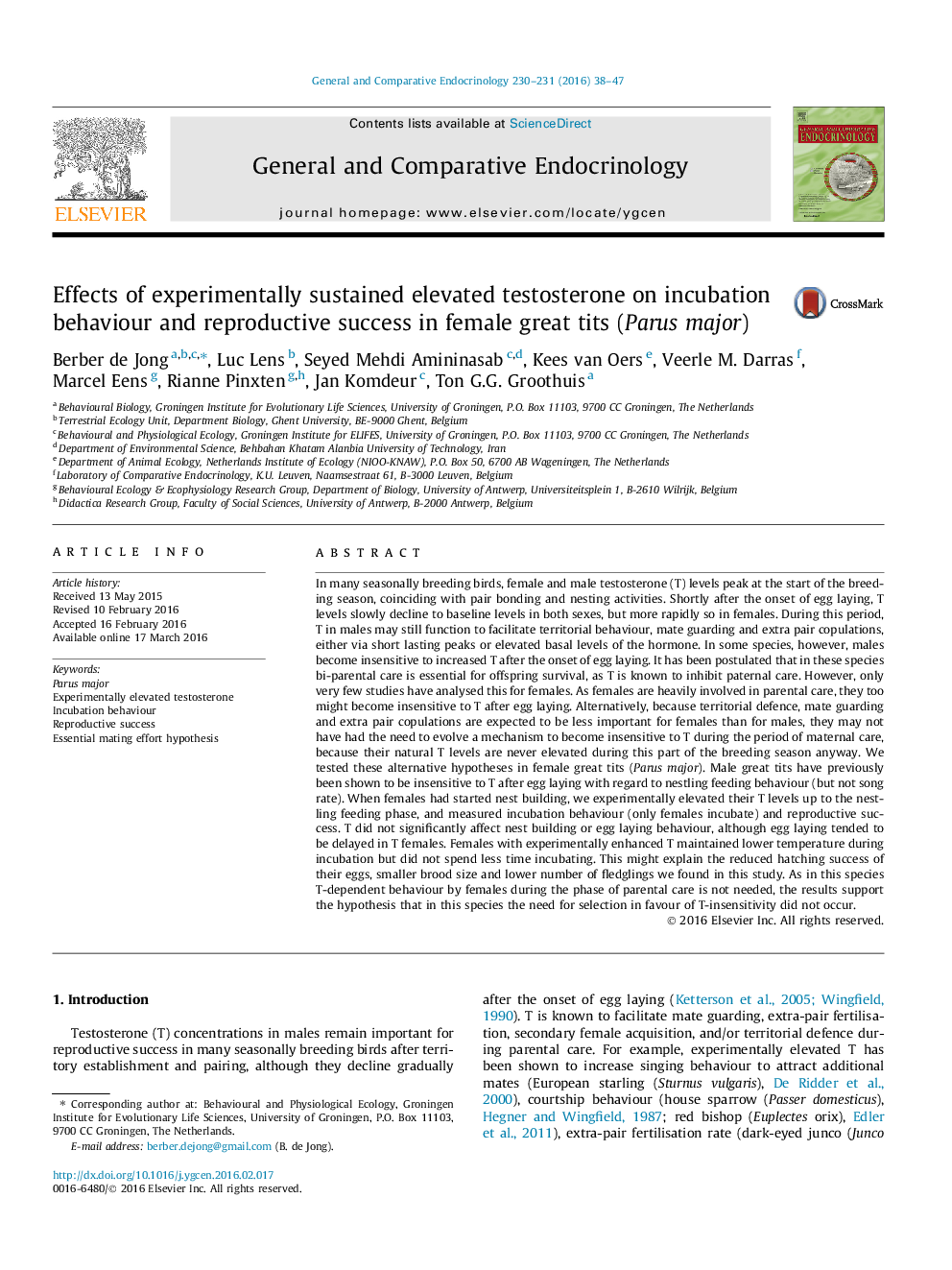| کد مقاله | کد نشریه | سال انتشار | مقاله انگلیسی | نسخه تمام متن |
|---|---|---|---|---|
| 5900773 | 1568876 | 2016 | 10 صفحه PDF | دانلود رایگان |
عنوان انگلیسی مقاله ISI
Effects of experimentally sustained elevated testosterone on incubation behaviour and reproductive success in female great tits (Parus major)
ترجمه فارسی عنوان
اثرات تستوسترون بر پایه تجربی ثابت شده بر رفتار انکوباسیون و موفقیت تولید مثل در جوانان بزرگ زن (پاروس عمده)
دانلود مقاله + سفارش ترجمه
دانلود مقاله ISI انگلیسی
رایگان برای ایرانیان
کلمات کلیدی
پاروس بزرگ، تستوسترون بالقوه آزمایشگاهی، رفتار انکوباتور، موفقیت تولید مثل، فرضیه تلاش مشتمل بر ضرورت،
موضوعات مرتبط
علوم زیستی و بیوفناوری
بیوشیمی، ژنتیک و زیست شناسی مولکولی
علوم غدد
چکیده انگلیسی
In many seasonally breeding birds, female and male testosterone (T) levels peak at the start of the breeding season, coinciding with pair bonding and nesting activities. Shortly after the onset of egg laying, T levels slowly decline to baseline levels in both sexes, but more rapidly so in females. During this period, T in males may still function to facilitate territorial behaviour, mate guarding and extra pair copulations, either via short lasting peaks or elevated basal levels of the hormone. In some species, however, males become insensitive to increased T after the onset of egg laying. It has been postulated that in these species bi-parental care is essential for offspring survival, as T is known to inhibit paternal care. However, only very few studies have analysed this for females. As females are heavily involved in parental care, they too might become insensitive to T after egg laying. Alternatively, because territorial defence, mate guarding and extra pair copulations are expected to be less important for females than for males, they may not have had the need to evolve a mechanism to become insensitive to T during the period of maternal care, because their natural T levels are never elevated during this part of the breeding season anyway. We tested these alternative hypotheses in female great tits (Parus major). Male great tits have previously been shown to be insensitive to T after egg laying with regard to nestling feeding behaviour (but not song rate). When females had started nest building, we experimentally elevated their T levels up to the nestling feeding phase, and measured incubation behaviour (only females incubate) and reproductive success. T did not significantly affect nest building or egg laying behaviour, although egg laying tended to be delayed in T females. Females with experimentally enhanced T maintained lower temperature during incubation but did not spend less time incubating. This might explain the reduced hatching success of their eggs, smaller brood size and lower number of fledglings we found in this study. As in this species T-dependent behaviour by females during the phase of parental care is not needed, the results support the hypothesis that in this species the need for selection in favour of T-insensitivity did not occur.
ناشر
Database: Elsevier - ScienceDirect (ساینس دایرکت)
Journal: General and Comparative Endocrinology - Volumes 230â231, 1 May 2016, Pages 38-47
Journal: General and Comparative Endocrinology - Volumes 230â231, 1 May 2016, Pages 38-47
نویسندگان
Berber de Jong, Luc Lens, Seyed Mehdi Amininasab, Kees van Oers, Veerle M. Darras, Marcel Eens, Rianne Pinxten, Jan Komdeur, Ton G.G. Groothuis,
